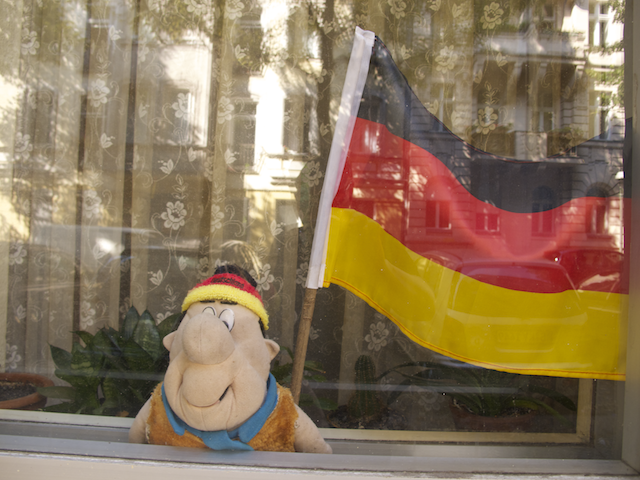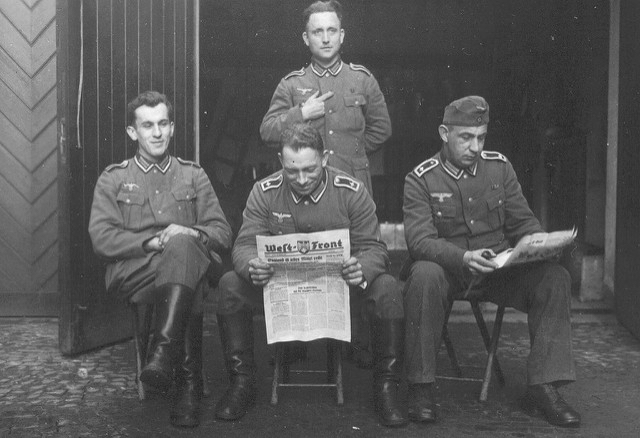The Germans, I am apt to believe, derive their original from no other people; and are now way mixed with different nations arriving amongst them: since anciently those who went in search of new dwellings, travelled not by land, but were carried in fleets; and into that mighty ocean so boundless, and, as I may call it, so repugnant and forbidding, ships from our world rarely enter.
Moreover, besides the dangers from a sea tempestuous, horrid and unknown, who would relinquish Asia, or Africa, or Italy, to repair to Germany, a region hideous and rude, under a rigorous climate, dismal to behold or to manure [to cultivate] unless the same were his native country?
In their old ballads (which amongst them are the only sort of registers and history) they celebrate Tuisto, a God sprung from the earth, and Mannus his son, as the fathers and founders of the nation. To Mannus they assign three sons, after whose names so many people are called; the Ingaevones, dwelling next the ocean; the Herminones, in the middle country; and all the rest, Instaevones.
Some, borrowing a warrant from the darkness of antiquity, maintain that the God had more sons, that thence came more denominations of people, the Marsians, Gambrians, Suevians, and Vandalians, and that these are the names truly genuine and original. For the rest, they affirm Germany to be a recent word, lately bestowed: for that those who first passed the Rhine and expulsed the Gauls, and are now named Tungrians, were then called Germans: and thus by degrees the name of a tribe prevailed, not that of the nation; so that by an appellation at first occasioned by terror and conquest, they afterwards chose to be distinguished, and assuming a name lately invented were universally called Germans.
They have a tradition that Hercules also had been in their country, and him above all other heroes they extol in their songs when they advance to battle. Amongst them too are found that kind of verses by the recital of which (by them called Barding) they inspire bravery; nay, by such chanting itself they divine the success of the approaching fight. For, according to the different din of the battle they urge furiously, or shrink timorously. Nor does what they utter, so much seem to be singing as the voice and exertion of valour. They chiefly study a tone fierce and harsh, with a broken and unequal murmur, and therefore apply their shields to their mouths, whence the voice may by rebounding swell with greater fulness and force.
Besides, there are some of opinion, that Ulysses, whilst he wandered about in his long and fabulous voyages, was carried into this ocean and entered Germany, and that by him Asciburgium was founded and named, a city at this day standing and inhabited upon the bank of the Rhine: nay, that in the same place was formerly found an altar dedicated to Ulysses, with the name of his father Laertes added to his own, and that upon the confines of Germany and Rhoetia are still extant certain monuments and tombs inscribed with Greek characters. Traditions these which I mean not either to confirm with arguments of my own or to refute. Let every one believe or deny the same according to his own bent.

For myself, I concur in opinion with such as suppose the people of Germany never to have mingled by intermarriages with other nations, but to have remained a people pure, and independent, and resembling none but themselves. Hence amongst such a mighty multitude of men, the same make and form is found in all, eyes stern and blue, yellow hair, huge bodies, but vigorous only in the first onset. Of pains and labour they are not equally patient, nor can they at all endure thrift and heat. To bear hunger and cold they are hardened by their climate and soil.
For their covering a mantle is what they all wear, fastened with a clasp or, for want of it, with a thorn. As far as this reaches not they are naked, and lie whole days before the fire. The most wealthy are distinguished with a vest, not one large and flowing like those of Sarmatians and Parthians, but girt close about them and expressing the proportion of every limb. They likewise wear the skins of savage beasts, a dress which those bordering upon the Rhine use without any fondness or delicacy, but about which such who live further in the country are more curious, as void of all apparel introduced by commerce.
They choose certain wild beasts, and, having flayed them, diversify their hides with many spots, as also with the skins of monsters from the deep, such as are engendered in the distant ocean and in seas unknown. Neither does the dress of the women differ from that of the men, save that the women are orderly attired in linen embroidered with purple, and use no sleeves, so that all their arms are bare. The upper part of their breast is withal exposed.
Yet the laws of matrimony are severely observed there; for in the whole of their manners is aught more praiseworthy than this: for they are almost the only Barbarians contented with one wife, excepting a very few amongst them; men of dignity who marry divers wives, from no wantonness or lubricity, but courted for the lustre of their family into many alliances.
To the husband, the wife tenders no dowry; but the husband, to the wife. The parents and relations attend and declare their approbation of the presents, not presents adapted to feminine pomp and delicacy, nor such as serve to deck the new married woman; but oxen and horse accoutred, and a shield, with a javelin and sword. By virtue of these gifts, she is espoused. She too on her part brings her husband some arms. This they esteem the highest tie, these the holy mysteries, and matrimonial Gods.
That the woman may not suppose herself free from the considerations of fortitude and fighting, or exempt from the casualties of war, the very first solemnities of her wedding serve to warn her, that she comes to her husband as a partner in his hazards and fatigues, that she is to suffer alike with him, to adventure alike, during peace or during war. This the oxen joined in the same yoke plainly indicate, this the horse ready equipped, this the present of arms. ‘Tis thus she must be content to live, thus to resign life. The arms which she then receives she must preserve inviolate, and to her sons restore the same, as presents worthy of them, such as their wives may again receive, and still resign to her grandchildren.

They therefore live in a state of chastity well secured; corrupted by no seducing shows and public diversions, by no irritations from banqueting. Of learning and of any secret intercourse by letters, they are all equally ignorant, men and women. Amongst a people so numerous, adultery is exceeding rare; a crime instantly punished, and the punishment left to be inflicted by the husband. He, having cut off her hair, expells her from his house naked, in presence of her kindred, and pursues her with stripes throughout the village. For, to a woman who has prostituted her person, no pardon is ever granted. However beautiful she may be, however young, however abounding in wealth, a husband she can never find.
In all their houses the children are reared naked and nasty; and thus grow into those limbs, into that bulk, which with marvel we behold. They are all nourished with the milk of their own mothers, and never surrendered to handmaids and nurses. The lord you cannot discern from the slave, by any superior delicacy in rearing. Amongst the same cattle they promiscuously live, upon the same ground they without distinction lie, till at a proper age the free-born are parted from the rest, and their bravery recommend them to notice. Slow and late do the young men come to the use of women, and thus very long preserve the vigour of youth. Neither are the virgins hastened to wed. They must both have the same sprightly youth, the like stature, and marry when equal and able-bodied.
Thus the robustness of the parents is inherited by the children. Children are holden in the same estimation with their mother’s brother, as with their father. Some hold this tie of blood to be most inviolable and binding, and in receiving of hostages, such pledges are most considered and claimed, as they who at once possess affections the most unalienable, and the most diffuse interest in their family. To every man, however, his own children are heirs and successors: wills they make none: for want of children his next akin inherits; his own brothers, those of his father, or those of his mother. To ancient men, the more they abound in descendants, in relations and affinities, so much the more favour and reverence accrues. From being childless, no advantage nor estimation is derived.
All the enmities of your house, whether of your father or of your kindred, you must necessarily adopt; as well as all their friendships. Neither are such enmities unappeasable and permanent: since even for so great a crime as homicide, compensation is made by a fixed number of sheep and cattle, and by it the whole family is pacified to content. A temper this, wholesome to the State; because to a free nation, animosities and faction are always more menacing and perilous. In social feasts, and deeds of hospitality, no nation upon earth was ever more liberal and abounding.
Adapted from Tacitus on Germany. Published under a Creative Commons license courtesy of Project Gutenberg. Photographs by Joel Schalit.





